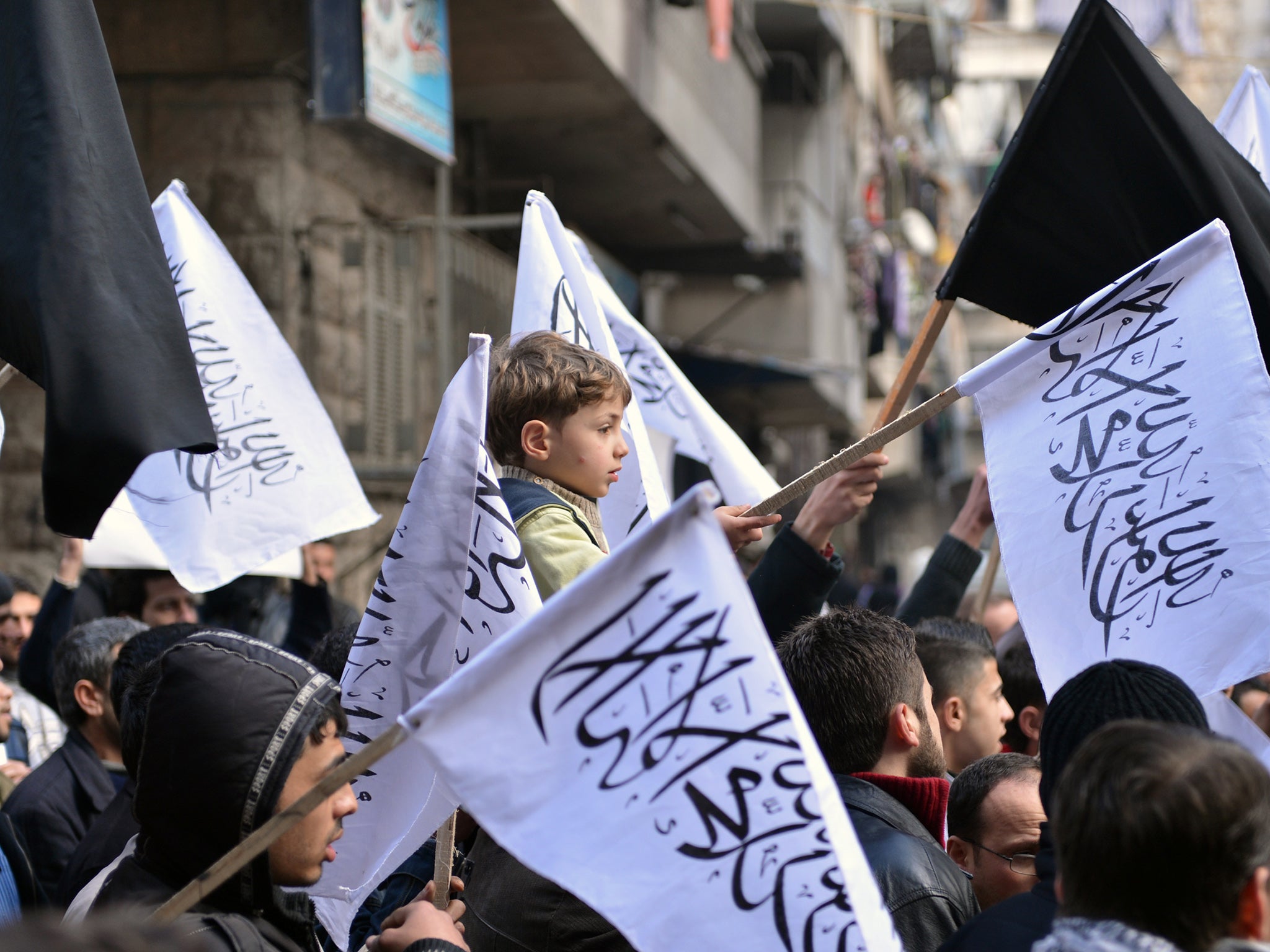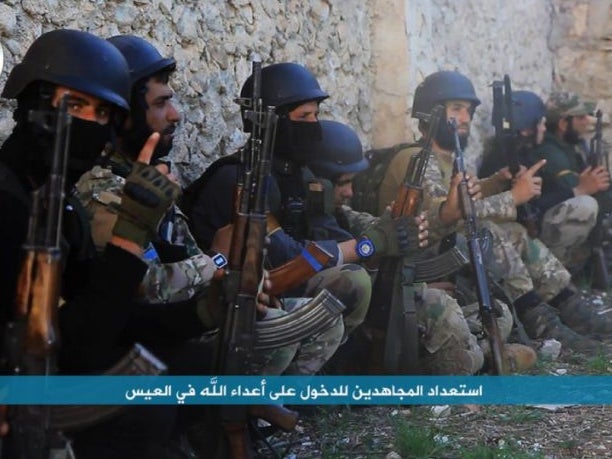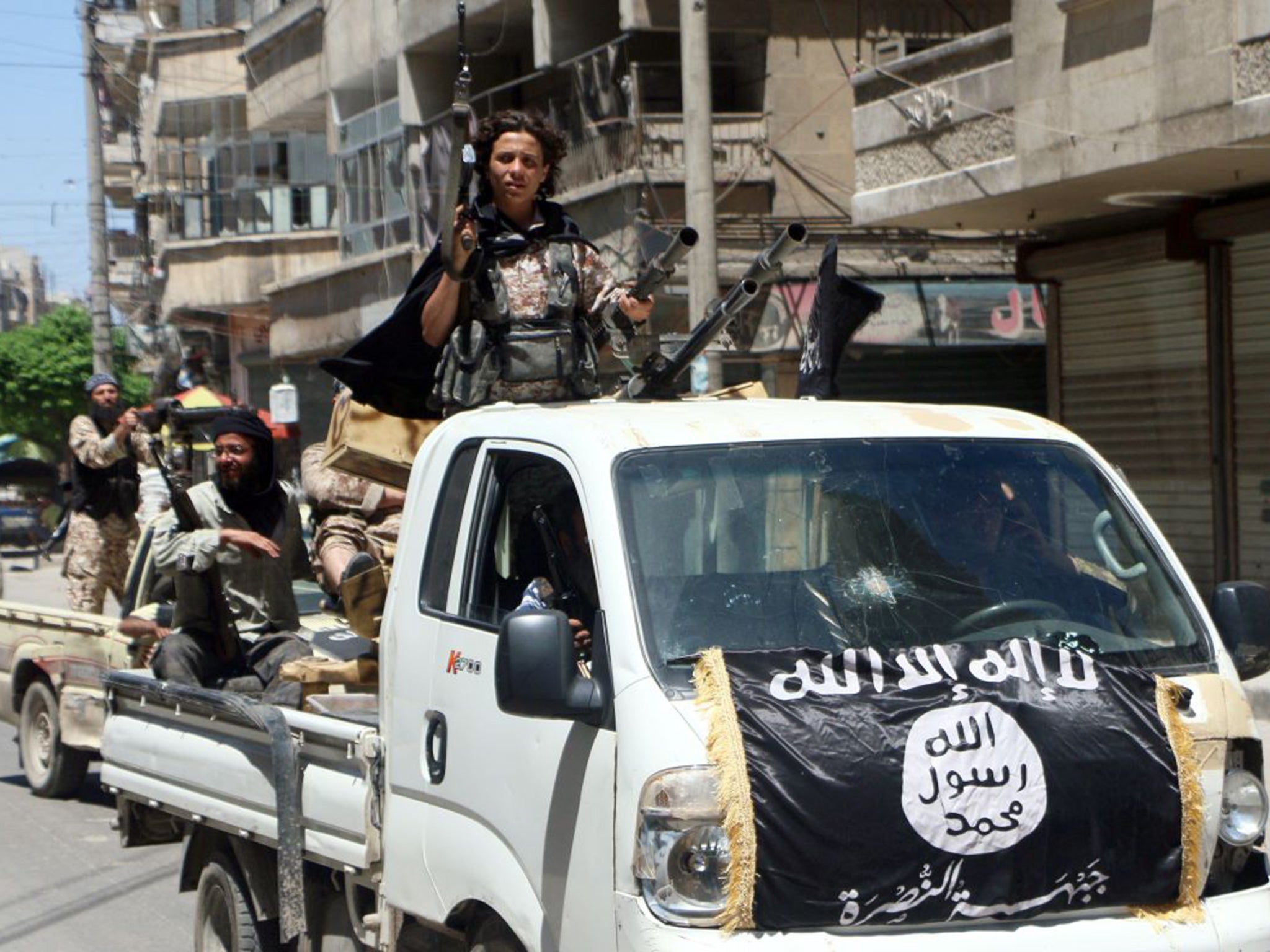Al-Qaeda could be preparing to launch own 'Islamic State' in Syria after exploiting world's focus on Isis
Analysts warn that its affiliate Jabhat al-Nusra has been quietly gathering power in its rival's shadow

Your support helps us to tell the story
From reproductive rights to climate change to Big Tech, The Independent is on the ground when the story is developing. Whether it's investigating the financials of Elon Musk's pro-Trump PAC or producing our latest documentary, 'The A Word', which shines a light on the American women fighting for reproductive rights, we know how important it is to parse out the facts from the messaging.
At such a critical moment in US history, we need reporters on the ground. Your donation allows us to keep sending journalists to speak to both sides of the story.
The Independent is trusted by Americans across the entire political spectrum. And unlike many other quality news outlets, we choose not to lock Americans out of our reporting and analysis with paywalls. We believe quality journalism should be available to everyone, paid for by those who can afford it.
Your support makes all the difference.Al-Qaeda could be preparing to declare its own sovereign state in Syria after quietly gathering strength in the shadow of the international campaign against Isis, an analyst has warned.
Charles Lister, a senior fellow at the Middle East Institute, said that after five years building its power base in the midst of the civil war leaders are moving to create a new “Islamic emirate”.
Writing in Foreign Policy magazine he said Jabhat al-Nusra - the al-Qaeda affiliate that was linked with Isis until a bitter split in 2013 - had been building local support and influence in its territories.

He warned that as part of a “long-game” strategy like that that seen in the terrorist group’s Yemen and Mali insurgencies, leading jihadists had been dispatched to drive the creation of an emirate and quash internal opposition.
“With the cessation of hostilities effectively over and the political process in Geneva falling apart, Jabhat al-Nusra’s leverage on the ground is increasing once again,” Mr Lister wrote.
“Whether we like it or not, the United States and its allies are now in an urgent battle for influence with al-Qaeda’s most effective and successful affiliate yet.
“The consequences of ignoring, or losing, that battle are potentially catastrophic.”
It was unclear when the reported plans for an emirate in the north-western Idlib province could come to fruition as attempts to restore a “cessation of hostilities” agreed in February continues.
Jabhat al-Nusra was excluded from the agreement as an internationally designated terrorist group and has recently been launching an offensive in parts of Aleppo governorate.
Mr Lister quoted a Syrian Islamist saying that local jihadists did not support the creation of an emirate, with “difficult discussion” among extremists continuing, while a commander in the Free Syrian Army said moderate rebels felt pressured into co-operating with Jabhat al-Nusra against regime forces.
“The only way to effectively and durably counter Jabhat al-Nusra’s emirate ambitions lies in efforts to significantly embolden and re-empower Syria’s moderate civil, political, judicial and military opposition,” he wrote in an email to The Independent.
“Western policy must now urgently empower the totality of Syria’s moderate opposition utilising an ink spot strategy, aimed at establishing steadily expanding zones of representative Syrian moderate control that are confident and powerful enough to repel al-Qaeda.”
A report by the London-based International Alert charity found that young Syrian men were being attracted to join Jabhat al-Nusra by lucrative salaries around four times those offered by the moderate Free Syrian Army.
Researchers concluded that it had also been more successful than Isis in attracting impoverished and unemployed youths with the promise of security, education, structure and, most importantly, victory.
“Many Syrians want to get revenge against the regime for destroying their families, houses, lives and everything else,” a Syrian refugee in Turkey was quoted as saying. “Jabhat al-Nusra actually fights the regime and now offers the best chance to get that revenge.”
Analysts say an al-Qaeda emirate could have significant consequences within Syria, forcing Jabhat al-Nusra to harden its stance towards civilians and the other rebel groups it occasionally allies itself with, as well as enforcing a strict interpretation of Sharia law in its territories.
It could follow the bloody example set by Isis’ declaration its “Islamic State”, which was followed by a continuing wave of executions, crucifixions, amputations and floggings, among other atrocities against perceived enemies and religious minorities.
A rival al-Qaeda emirate could also revitalise the organisation’s international support, potentially inspiring declarations of allegiance and terror attacks by followers, last seen in Europe in the Charlie Hebdo massacre.
Jabhat al-Nusra could be strengthened further by attacks on Isis by the US-led coalition, allowing it to feed off wavering support and defections, experts have said.

Earlier this year, the US-based Institute for the Study of War think tank warned that the al-Qaeda affiliate was operating a sophisticated strategy to let Isis “attract the attention - and attacks - of the West while it builds the human infrastructure to support and sustain major gains in the future and for the long term”.
Analysts said the rivalry between the two groups, which has split the global Salafist movement into two camps, has “raised the bar for success” in international terrorism and ensured that destroying one will allow the other to move into the ensuing power vacuum.
Jennifer Cafarella, a fellow at the Institute for the Study of War, said Jabhat al-Nusra had a fighting force of 3,000 to 5,000 militants, including “elite” units, at least 19 training camps, governance structures and operations in at least eight of Syria’s nine western provinces.
In a February report she warned the group had become “more dangerous than Isis” as it tactically supports the Syrian opposition to build local allegicances that it will manipulate at a later stage.
“The group already governs parts of Syria with a form of religious law akin to that used by Isis,” Ms Cafarella said.
“Meanwhile, through military and religious training camps for children, it is indoctrinating a new generation of fighters to wage a future war against the West…we must abandon our fixation on Isis and recognise Jabhat al-Nusra as the bigger threat.”
Join our commenting forum
Join thought-provoking conversations, follow other Independent readers and see their replies
Comments